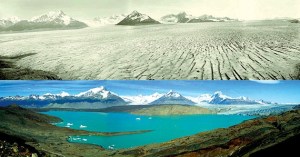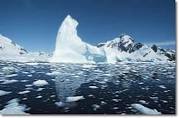 A massive report on the impact of global warming is being completed by the Intergovernmental Panel on Climate Change. This report explains to the world what the representatives of approximately 100 governments concluded at their meeting in Japan in late March. AP reported: “The key message from leaked drafts and interviews with the authors and other scientists: The big risks and overall effects of global warming are far more immediate and local than scientists once thought. It’s not just about melting ice, threatened animals and plants. It’s about the human problems of hunger, disease, drought, flooding, refugees and war, worsening.”
A massive report on the impact of global warming is being completed by the Intergovernmental Panel on Climate Change. This report explains to the world what the representatives of approximately 100 governments concluded at their meeting in Japan in late March. AP reported: “The key message from leaked drafts and interviews with the authors and other scientists: The big risks and overall effects of global warming are far more immediate and local than scientists once thought. It’s not just about melting ice, threatened animals and plants. It’s about the human problems of hunger, disease, drought, flooding, refugees and war, worsening.”
I am always amazed at how people respond to these reports. Many are skeptical and some are fanatical. But both extremes are neither good science nor good public policy. The key, it seems to me, is to marry the two in some effective way. I hope this happens but I am not holding my breath about it. The effects of global warming, which are being accepted by a growing number of us, are still not seen as immediate enough to cause anything like serious alarm or action. I am not quite sure why but my sense of the issue is that we do not, in general, really think this is a problem we can do anything about. It has been so politicized that we seem “tone deaf” about the consequences of climate change. Many of my Christian friends admit the evidence for global warming but then shift to arguments that deny what climate scientists tell us. (Yes, I know some climate scientists disagree with such a report but the number strikes me as declining with every passing year.)

I was once a skeptic, at least broadly speaking, about climate science. My view has changed. I believe the preponderance of evidence supports these warnings even if they are too dire in some cases. (Some models suggest that they are too conservative!) As a Christian steward I cannot ignore the earth and mock the science behind this growing problem. I am no expert but I have read both sides and my mind has changed. Now the hard part – what should I do and how should I do it? I am not given to “apocalypse now” scenarios nor am I a skeptical conservative about science in general and this science in particular.
Does Christ’s kingdom mandate that we seek to protect our atmosphere/biosphere wherever possible? Or is the earth simply an inexhaustible resource that we can abuse and then throw away? I think most of you know the answer to that question. Now I wonder, “What will we do?”
It is shocking to me to see how serious the Catholic Church is about this matter while non-Catholic evangelicals continue to seem intent on rejecting a great deal of this kind of science and thus ignore the problems this is causing, and likely will cause, to both us, our children and our grandchildren. The same people who rightly argue that national debt could destroy us seem content to ignore climate science. I guess I do not get it. I am concerned deeply about both. And in both cases there are steps we can take to change the scenario. One is more immediate but the other is more fatal to human and animal life in the end. I think we need a more comprehensive Christian social policy and this issue must be on the agenda.
Related Posts
Comments
My Latest Book!

Use Promo code UNITY for 40% discount!






John, I wonder if part of the problem in the reaction of conservative Evangelicals in regards to this isn’t our connection to Enlightenment thinking. In many ways Evangelicalism wasn’t as much a rejection of Enlightenment thinking as it was an adaptation to it. The Enlightenment saw the individual as central, sought to minimize government’s power over the individual, put faith in technology, and favored a hidden hand view of social interconnectedness over the Medieval understanding of the commons of public life. As Evangelical helped adapt the Christian message to an Enlightenment way of thinking it bread a sort of need for Enlightenment ideals into its new form of Christianity. All of these ideas clash against the needs implied by the whole global warming scenario.
I don’t think it is a catholic/evangelical divide I think it is a political divide. Evangelicals in Europe are not climate skeptics. NT Wright and John Stott have included chapters on environment in basic Christian theology or discipleship books. (And then are ridiculed about them in Amazon reviews). And I know a number if catholic climate skeptics in the US.
I really think it is a good example of how our politics informs our theology and not the other way around.
The underlying problem is not the climate, or science, or technology, or the population, or capitalism, or whatever. The underlying problem is sin. To try to deal with the climate problem apart from the sin problem is futile. But the connection between the climate and sin is difficult to make.
If “we” are the one spoiling God’s creation then isn’t that sin?
By “we” I mean humans who create systemic ways of living and spending and making culture they fits their desires.
Have you seen this outstanding article on the subject which was penned by your colleague?
http://www.wheaton.edu/CACE/Print-Resources/~/media/1A6F51F87327432788A292F9A46CC2DB.pdf
Denise Murphy Plichta, this is a walk-off home run article. I wish everyone who is deeply interested in climate and solid theology would read it carefully. And to think I see the author every week and never know he wrote this until someone from FL told me. 🙂
Wayne Larson liked this on Facebook.
Richard Kidd liked this on Facebook.
Ben Lowe liked this on Facebook.
EfrenyDeanna Valdespino liked this on Facebook.
Robert J. Evans II liked this on Facebook.
Alexei N. Laushkin liked this on Facebook.
John Monroe liked this on Facebook.